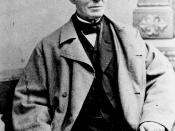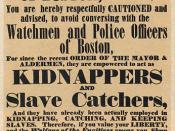Abolitionism and the Underground Railroad in Massachusetts
Massachusetts was one of the prominent northern states which sought freedom for blacks subject to the oppression of slavery in the south in the nineteenth century. Men such as Wendell Philips and Samuel J. May of Boston epitomized the abolitionist cause in the north, not only by speaking out against the injustice of slavery but by harboring these very slaves in shelters in and around Massachusetts. The state served as a sort of buffer ground for escaped slaves seeking freedom and justice--New Bedford and Boston were primary stops for thousands of northbound escapees. Of the freedom offered by Massachusetts, African American Reverend W. M. Mitchell wrote:
It is a glorious thing to gaze for the first time upon a land, where a poor Slave, flying from a so-called land of justice and liberty, would in a moment find his fetters broken, his shackles loosed, and whatever he was in the land of Washington, beneath the shadow of Bunker's Hill, or even Plymouth Rock, here he becomes a man and a brother.1
These stops were part of a larger network run by abolitionists called the Underground Railroad, a phrase coined by a southern slaveholder who noted that the slaves seemed to conceal themselves so well and transport themselves so efficiently toward the northern free states. Controversies, however, abounded amidst the struggles; violent disputes erupted over the issues and difficulties posed by the oppressive Fugitive Slave Act. The state of Massachusetts played a prominent role in the abolitionist movement and served as a key station on the Underground Railroad.
Slavery in America traces back its origins to the eighteenth century triangular slave trade. This system was composed of three parts: European goods were traded for African slaves; African slaves were sold in the Americas for...


